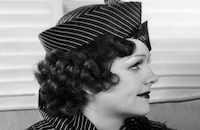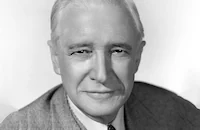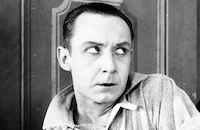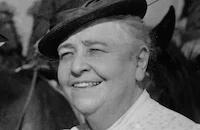Bed of Roses

Brief Synopsis
Cast & Crew
Gregory Lacava
Constance Bennett
Joel Mccrea
John Halliday
Pert Kelton
Samuel Hinds
Film Details
Technical Specs

Synopsis
As soon as they are released from prison, crafty and tough Lorry Evans and Minnie Brown board a Mississippi River steamboat bound for New Orleans. Short on cash, the women invite two boll weevil exterminators to their cabin and, after getting them drunk, steal their money. When Lorry's activities are reported to the captain, she jumps overboard rather than be arrested, but loses the stolen cash as she is pulled from the water by Dan, the skipper of a passing cotton barge. Although she is attracted to the manly Dan, Lorry robs him of sixty dollars and, once docked in New Orleans, heads for the office of Stephen Paige, a wealthy publisher whom she had spotted on the steamboat. Using an array of feminine tricks, Lorry seduces the straight-laced Stephen and then blackmails him into making her his well-kept mistress. Once established with Stephen, Lorry returns to Dan's barge to repay him for his involuntary loan and ends up falling in love with him. Although she at first accepts Dan's marriage proposal, Lorry, who has kept her affair a secret, changes her mind when a lovesick Stephen convinces her that her past deceptions will one day lead to Dan's ruin. Lorry abandons Dan but, rather than stay with Stephen, moves to a roominghouse and takes a job in a department store. With Minnie's help, Stephen locates Lorry and, during a Mardi Gras party, makes a final, unsuccessful bid for her return. Minnie, seeing her friend's desperation, tracks down Dan and, after revealing her friend's past, reunites the two lovers.

Director

Gregory Lacava
Cast

Constance Bennett

Joel Mccrea

John Halliday

Pert Kelton

Samuel Hinds

Franklin Pangborn
Tom Francis

Jane Darwell
Crew
Pandro S. Berman
John Cooney
Merian C. Cooper
George D. Ellis
Charles Kerr
Edward Killy
Chick Kirk
Gregory Lacava
Van Nest Polglase
Frank Redman
Charles Rosher
Max Steiner
Eugene Thackrey
Wanda Tuchock
Basil Wrangell

Videos
Movie Clip


Film Details
Technical Specs

Articles
Bed of Roses
What Hall alludes to, but doesn't spell out, is that Bennett's Lorry is a prostitute, the sort of resourceful, cheerful working girl that you would often encounter in pre-code pictures, women presented without apology, excuses, or excessive moral handwringing. As the film opens, Lorry and her even saucier pal, Minnie (Pert Kelton), are being released from their incarceration, uncertain about what to do next but not too worried about it. They board a Mississippi river boat, hoping to get to New Orleans, though they don't have enough dough to get that far. After stealing money from a drunken businessman, Lorry is forced to jump overboard to avoid capture, and a small cotton boat that's passing nearby pulls her aboard. The boat's affable but businesslike captain, Dan (Joel McCrea), takes a shine to her, but his feelings harden after she steals money from him and disappears.
Even so, Lorry isn't the woman Dan thinks she is, and though she takes up with a rich publisher sugar-daddy (played by John Halliday), she never quite forgets her cotton-boat captain. The picture may take the typical pre-code liberties as far as sexual mores are concerned, but like so many pre-code pictures, it stresses that honesty and spiritual virtue say more about a person's character than any carnal misbehavior on his or her part.
Despite Mr. Mordaunt Hall's shock and dismay that Bennett might now and then play something other than an upstanding Maugham heroine, the actress' role in Bed of Roses was somewhat typical of the characters she was playing at the time. Bennett came from a family of actors: Her father, theater actor Richard Bennett (possibly best known to movie fans as Major Amberson in The Magnificent Andersons, 1942), and her mother, silent film actress Adrienne Morrison, raised three future actresses, Barbara, Constance and Joan. Constance may have been the most spirited of the three: She launched a career in silent films, only to "retire" after her marriage, in 1925, to railroad heir and playboy Philip Morgan Plant. After divorcing Plant in 1929, she resuscitated her career and found great success in talkies, often playing desperate or somehow compromised women in pictures like Sin Takes a Holiday (1930), with Basil Rathbone, or the 1931 The Easiest Way, with Robert Montgomery, though Bennett also starred in George Cukor's 1932 What Price Hollywood?, a role many consider to be the best of her career.
In Bed of Roses, Bennett is a vibrant presence - even when she's playing a believably hardscrabble character, she always allows the requisite amounts of glamour to shimmer through. She makes a great duo with Kelton, whose Minnie is a breezily off-color firecracker, a woman who puts fun before proper moral conduct and still comes out ahead in the end. (And some of the lines she mutters are salty even by pre-code standards.) Kelton worked steadily in comic bit parts through the 1930s, and in the early 1950s she played the first Alice Kramden on The Honeymooners, opposite Jackie Gleason. Shortly thereafter, Kelton was blacklisted - at which point she was replaced on The Honeymooners by Audrey Meadows - and didn't begin working again until the early 1960s: She played Mrs. Paroo, Marian the Librarian's mother, in the 1962 film of The Music Man.
Of the three principal actors in Bed of Roses, Joel McCrea would have the longest, steadiest, most varied career. McCrea had appeared in nearly two dozen films by 1933, often in small parts (though he did play the lead role in Irving Pichel and Ernest B. Schoedsack's The Most Dangerous Game, 1932). As he told film journalist Gerald Peary in 1983, he got his start in the late 1920s, thanks to Cecil B. DeMille. "I used to be your newsboy," he told the director. "You gave me a silver dollar at Christmas because I put your papers on the porch when it rained." DeMille cast him in a small role in the 1929 coal-mine drama Dynamite, launching a career that would stretch well into the 1970s - a reasonable payoff for making the extra effort to keep a newspaper dry, instead of just flinging it onto the walk.
Producer: Pandro S. Berman
Director: Gregory LaCava
Screenplay: Wanda Tuchock (written by); Gregory LaCava, Eugene Thackrey (dialogue)
Cinematography: Charles Rosher
Film Editing: Basil Wrangell
Cast: Constance Bennett (Lorry Evans), Joel McCrea (Dan), John Halliday (Stephen Paige), Pert Kelton (Minnie), Samuel Hinds (Father Doran), Franklin Pangborn (Floorwalker), Tom Francis (Salesman).
BW-67m.
by Stephanie Zacharek (Stephanie is the chief movie critic for Movieline - www.movieline.com)
SOURCES
Gerald Peary interview with Joel McCrea, The Boston Herald, March 22, 1983
The New York Times
IMDB

Bed of Roses
Quotes
Save your wind, save your wind, you might want to go sailing sometime.- Lorry Evans
Trivia
Notes
Sources disagree concerning Wanda Tuchock's credits. While the onscreen credits state simply that the film is "by" Tuchock, reviews and other sources list her as either the sole writer of the original story, the co-story writer (with Eugene Thackrey) and co-dialoguer, or the author of the story and the screenplay. According to Motion Picture Herald's "In the Cutting Room," Eileen Percy, a film-actress-turned-newspaper-columnist, was to be in the cast, but her participation in the final film has not been confirmed. Pert Kelton, whose "Mae Westian" performance was singled out by reviewers, was a Ziegfeld Follies dancing comedienne. Modern sources state that Phillips Holmes was cast first in the part of "Dan," but was replaced by Joel McCrea early in the production, and that Harold Hecht choreographed the Mardi Gras sequence.

Miscellaneous Notes
Released in United States 1933
Released in United States 1933













